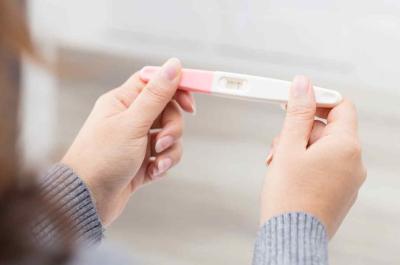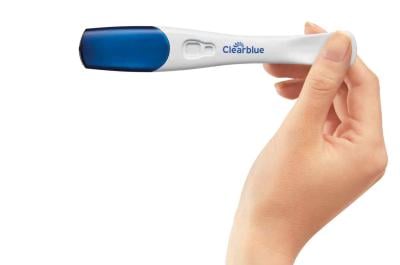
You may have heard about the so-called pregnancy hormone, but what is it? All pregnancy tests detect the presence of the hormone hCG, or human chorionic gonadotropin to give its scientific name, in either blood or urine. If you’d like to know why your body produces hCG, how its levels go up, what hCG levels can tell your doctor and whether it causes morning sickness, read on.
What is hCG?
Human chorionic gonadotropin (hCG) is a hormone that’s made first by the embryo and then by the placenta. This hormone stimulates the production of increased estrogen and progesterone during pregnancy and is the hormone detected by all pregnancy tests, whether at home in your urine or in a blood test at the doctor’s office. It's generally measured in milli-international units per milliliter (mIU/ml).
What is the role of hCG?
The hCG hormone plays a vital role in early pregnancy as it promotes progesterone production by the corpus luteum1, the bit that’s left over when the egg is released from the ovary. HCG, together with hormones like progesterone and estrogen, also helps maintain the uterus lining. It also stimulates the thyroid gland2 and supports the implantation of the blastocyst (which will later develop into the baby). Since this hormone is produced by the fertilized egg and later the placenta, it’s a useful hormone to detect pregnancy.
How do your hCG levels change during early pregnancy?
The levels of hCG rise rapidly in the earliest days of pregnancy and can be detected around eight days after the estimated day of conception in the blood by the most sensitive laboratory methods. Home pregnancy tests can detect it a few days later in urine depending on their sensitivity. HCG levels rise quickly and exponentially, usually doubling every 2 days3,4 in the first weeks before reaching a steady level (plateau) around week 10, after which time they slowly decline.
HCG level during pregnancy: Does a high hCG level mean pregnancy?
In the vast majority of cases, yes. The typical hCG level around four weeks of pregnancy is around 140 mIU/ml5, so a high hCG level can be generally considered to mean you are pregnant. However, there are some very rare medical conditions that can cause high hCG levels. If you get a positive result on a pregnancy test and you haven’t had unprotected sex since your last menstrual period, see your doctor.
What level of hCG is considered to be caused by pregnancy?
HCG starts to appear in tiny amounts in urine around 7 - 9 days after ovulation. One study showed a median concentration of 4 mIU/ml on day 9 and 12 mIU/ml by day 10, showing the rapid rise that occurs in early pregnancy5.
So, what does this mean? With the very rare exception of those with certain medical conditions, (or if you've taken medication containing hCG before testing), if your pregnancy test detects the presence of hCG, you are pregnant. However, even if your result is negative, if you are very early into your pregnancy, you could still be pregnant even if the pregnancy test is negative, because hCG levels are still low. For example, a week after you’ve conceived (approximately one week after ovulation), the hCG levels in your urine are still very close to zero.
What level of hCG can pregnancy tests detect?
Generally, most home pregnancy tests claim to detect hCG levels from 25 mIU/ml. However, some tests, such as the Clearblue Digital Ultra Early Pregnancy Test, are so sensitive they can detect hCG levels as low as 10 mIU/ml.
Rise of pregnancy hormone
(hCG) in early pregnancy
concentration
period
period
How do pregnancy tests use hCG to detect pregnancy?
Home pregnancy tests work by using antibodies to detect hCG in your urine. The embryo starts producing hCG around six to seven days following fertilization, and then at an increasing rate, especially once it has implanted in the uterus. Most home pregnancy tests can detect hCG levels at least from the day your period is due, but some tests are more sensitive, so look for a more sensitive one you can use in the days before your missed period if you’d prefer not to wait. A positive result means there is hCG in your urine. Genuine false-positives are incredibly rare, so any positive, even a faint line, almost certainly means pregnancy is detected.
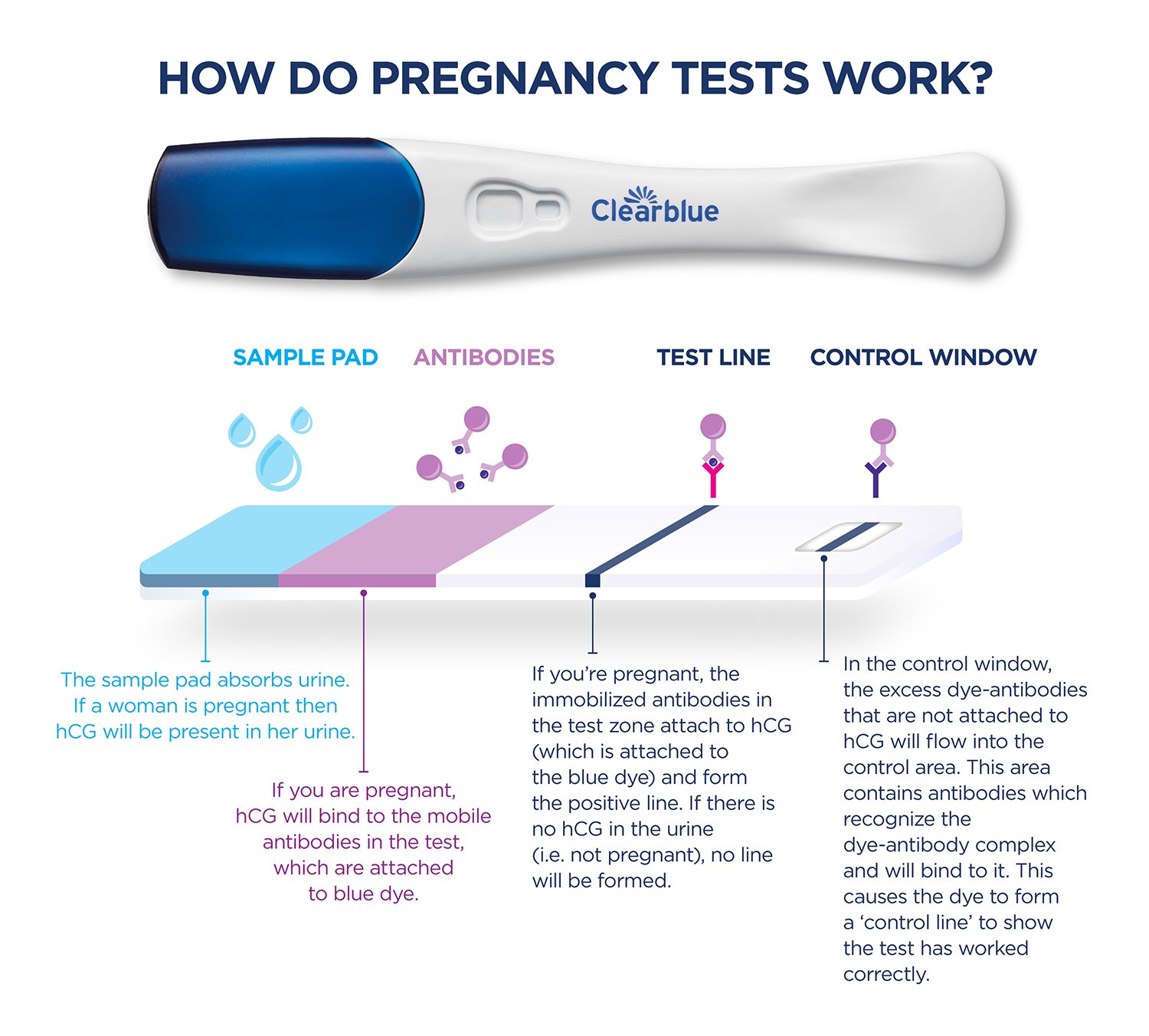
Most home pregnancy tests claim to be more than 99% accurate at detecting pregnancy from the day you expect your period. You can find out more about pregnancy tests, how to use them, how to read them, and the types available on our page about Clearblue pregnancy tests.
In addition to urine pregnancy tests (like most home pregnancy tests), you can also detect pregnancy with pregnancy blood tests. These detect the hCG in the blood, but there are two types8:
- Qualitative pregnancy blood test. This measures whether there is any hCG hormone in the blood stream, with a positive or negative result, but won’t tell you how much hCG is present.
- Quantitative pregnancy blood test. This type of test actually measures the levels of hCG in the blood. In most instances, this test is only done in cases where a healthcare professional wants to know more about the state of the pregnancy, for example, if an ectopic pregnancy is suspected.
How do twins and multiples affect hCG levels?
Women pregnant with twins or multiples have high levels of hCG. This increased level of hCG could also be why some women who carry twins have severe morning sickness compared to women who are expecting only one baby. If you have a blood test to check your hCG levels and it’s higher than average, there is a chance that you are pregnant with more than one baby4,6.
Can hCG levels diagnose a miscarriage or an ectopic pregnancy?
Your hCG level can inform your doctor whether there is a risk of an ectopic pregnancy or whether a miscarriage has occurred. A declining or low rate of increase in hCG over 48 hours can be a sign of an ectopic pregnancy or miscarriage. In the case of an ectopic pregnancy, the hCG level may just plateau or increase at a very slow rate, but this can only be determined, usually in a doctor’s office or hospital, by using blood hCG levels to monitor how much hCG you have in the blood. If the hCG level continually declines, this points to a miscarriage having taken place or that the pregnancy may no longer continue. See your healthcare provider if you have any concerns7.
FAQs about hCG
What does hCG do to your body?
The hormone hCG ensures the corpus luteum, which forms in the ovary after ovulation, keeps producing progesterone during the first trimester until the placenta has developed.
Once the placenta has formed and produces progesterone, hCG levels go down as it’s no longer needed9, however they won’t fall below a level that would give a positive result on a pregnancy test.
The hormone hCG ensures the corpus luteum, which forms in the ovary after ovulation, keeps producing progesterone during the first trimester until the placenta has developed. Once the placenta has formed and produces progesterone, hCG levels go down as i
After a fertilized egg implants in the uterus lining, the placenta begins to develop and produces increasing amounts of hCG.
This is why hCG is considered a marker for implantation10.
Is there a connection between hCG levels and morning sickness?
You may have been told that morning sickness means a healthy baby. It may be scant comfort when you’re feeling so sick all the time, but there might be a grain of truth in it.
There are studies showing a relationship between morning sickness, a healthy pregnancy, and rising levels of hCG, but the jury is still out.
What does a low level of hCG mean?
A low hCG level can mean different things depending on how far along you are. If you are very early in your pregnancy, then hCG levels will likely be very low but in a normal, healthy pregnancy they will naturally increase rapidly.
However, if your hCG level starts to decrease, there may be a risk you are having/have had a miscarriage11.
If your hCG level is consistently low, with no increase or decrease, or if you experience any pain or bleeding, see your doctor immediately to rule out the risk of an ectopic pregnancy, when the fertilized egg implants outside the uterus11.
Are high hCG levels a bad thing?
If you have an hCG level higher than expected for your stage of pregnancy, it’s possible that you miscalculated when you got pregnant, and you’re further along than you thought.
Alternatively, it may be that you are pregnant with twins or multiples, as hCG is generally higher in this case.
Molar pregnancy (growth of abnormal, non-cancerous cells in the uterus) can also cause an elevated hCG level, which is higher than normal12.
Should I check my hCG levels regularly?
Unless you are showing any symptoms that your pregnancy is not progressing as it should, it is unlikely that your doctor will check your hCG level.
If you are bleeding or have a history of miscarriage, you may have your hCG checked regularly13.
What level of hCG is expected after a pregnancy loss?
Your hCG levels will normally decline after a miscarriage until they go back to close to zero within 6 weeks (depending on when the miscarriage occurred)14.
What can interfere with my hCG levels?
If you get a positive test result on your pregnancy test, you can consider yourself pregnant. False-positive results are very rare, but an early loss or some very rare cancers can cause the test to detect hCG13.
Also, if you are on any fertility medication containing hCG, (usually given by injection) this can also affect your test results.
However, other medications like hormonal contraceptives or antibiotics won’t affect your hCG level13.
HCG is one of the most important hormones in early pregnancy. It’s the reason the test turns positive. It continues to increase over the first trimester as your baby continues to grow and you may feel a little nauseous. Because hCG is usually only produced during pregnancy, if you see a positive result on a Clearblue pregnancy test, you can be more than 99% certain you are pregnant.
- Baird DD, Weinberg CR, McConnaughey DR, Wilcox AJ. Rescue of the corpus luteum in human pregnancy. Biol Reprod. 2003; 68(2):448-56.
- Grün JP, Meuris S, De Nayer P, Glinoer D. The thyrotrophic role of human chorionic gonadotropin (hCG) in the early stages of twin (versus single) pregnancies. Clin Endocrinol (Oxf). 1997; 46(6):719-25
- Nepomnaschy PA, Weinberg CR, Wilcox AJ, Baird DD. Urinary hCG patterns during the week following implantation. Hum Reprod. 2008; 23(2):271-7 and https://www.ncbi.nlm.nih.gov/pmc/articles/PMC4119102/
- https://www.fertstert.org/article/S0015-0282(12)02233-9/pdf
- https://www.ncbi.nlm.nih.gov/pmc/articles/PMC4119102/
- https://www.marchofdimes.org/complications/being-pregnant-with-twins-triplets-and-other-multiples.aspx Last reviewed March 2017
- https://www.ncbi.nlm.nih.gov/books/NBK132768/ published 2012
- https://medlineplus.gov/ency/article/003432.htm
- https://www.hormone.org/your-health-and-hormones/glands-and-hormones-a-to-z/hormones/human-chorionic-gonadotropin-hormone-hcg
- https://www.ncbi.nlm.nih.gov/pmc/articles/PMC4119102/
- 602ccb44d38c81.31989740.pdf (wwl.nhs.uk)
- Molar Hcg | South Tees Hospitals NHS Foundation Trust
- hCG Levels | The American Pregnancy Association
- 02-80-Monitoring-your-hormone-levels-in-early-pregnancy.pdf (mft.nhs.uk)
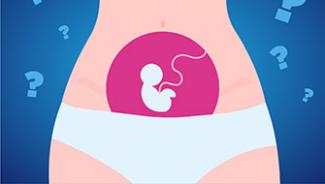
Think you might be pregnant?
Discover Clearblue Digital Ultra Early, our most sensitive digital pregnancy test that gives you digital results 6 days early.
Test sensitivity is 10mIU/ml. 78% of pregnant results can be detected 6 days before your missed period.
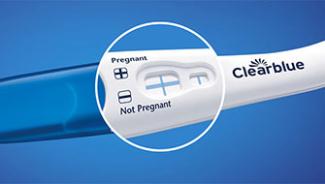
Get a pregnant result as fast as 1 minute from the day you miss your period
Clearblue Rapid Detection Pregnancy Test has been designed to offer you the easiest pregnancy testing experience, with the accuracy you expect from Clearblue – and a result as fast as 1 minute.
A pregnant result may appear in 1 minute when testing from the day of the missed period. Wait 3 minutes to confirm a not pregnant result.


